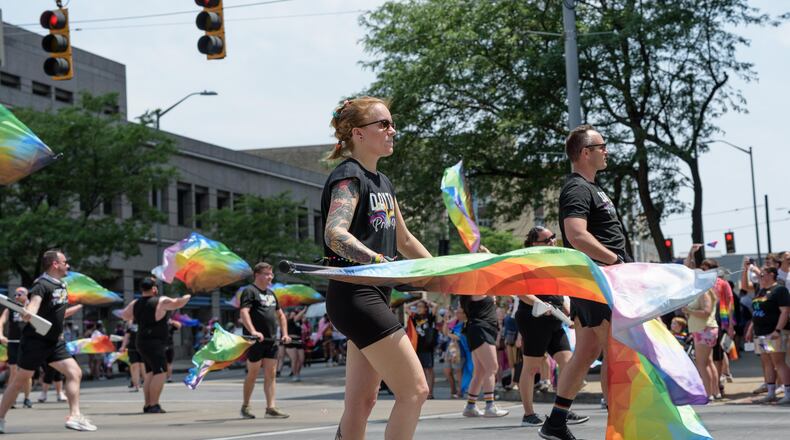“In today’s political climate, LGBTQ+ people are always aware of threats to our safety, so I think it makes us more vigilant as far as paying attention to our surroundings,” said Rick Flynn, executive director of the Greater Dayton LGBT Center. “It’s unfortunate, but it’s part of the world we’re in today.”
The Greater Dayton LGBT Center’s Pride events kick off with a Friday Night Affair from 6-10 p.m. on Friday at the center, followed by a parade and the Pride Festival from 11 a.m. to 4 p.m. on Saturday in downtown Dayton. This year’s parade begins on Second Street.
Each year, the center starts its security plans early with the Dayton Police Department, Flynn said. Post-COVID, they typically see between 3,000 and 4,000 attendees at Dayton Pride.
“We start working with Dayton Police Department early in the year to talk about making the site as secure as possible,” Flynn said. The center works with police to determine how many officers they should have, what kinds of barriers are needed and what kinds of contingency plans they should have in place.
“We follow their recommendations,” Flynn said.
Last year, the Greater Dayton LGBT Center paid approximately $6,043 for overtime services to the Dayton Police Department, according to Major Christopher Malson.
“The Dayton Police Department will have staffing that is in line with previous years and other similar events. The public’s safety is always our number one priority when considering staffing and security,” Malson said.
Foreign terrorist organizations and their supporters have previously promoted anti-LGBT rhetoric and targeted LGBT-related events or venues for attacks, the FBI said.
“We always have protestors, but we’re never sure how far some of them may go as far as presenting a physical threat,” Flynn said.
Those who attend Pride events or other venues for the LGBT community should stay vigilant, the FBI says.
“We remind our volunteers, staff and people attending any events to be aware and if you see something, say something,” Flynn said.
Possible indicators of potential threat activity, according to the FBI:
- Violent threats made online, in person or via mail.
- Unusual or prolonged testing or probing of security measures at events or venues.
- Photography of security related equipment, personnel or access points consistent with pre-operational surveillance without a reasonable alternative explanation.
- Unusual surveillance or interest in buildings, gatherings or events.
- Attempts to gain access to restricted areas, bypass security or impersonate law enforcement officials.
- Observation of or questions about facility security measures, including barriers, restricted areas, cameras and intrusion detection systems without a reasonable alternative explanation.
- Eliciting information from facility personnel regarding the nature of upcoming events, crowd sizes, busiest times of day, etc. without a reasonable alternative explanation.
- Attempts to enter a restricted area, bypass security or impersonate law enforcement officials.
If there is an emergency, contact local law enforcement or 911 immediately.
To report a threat, contact your local FBI field office by visiting fbi.gov/contact-us/field-offices or call 1-800-CALL-FBI (225-5324).
Report suspicious activity to the Department of Homeland Security at dhs.gov/see-something-say-something/how-to-report-suspicious-activity.
About the Author

